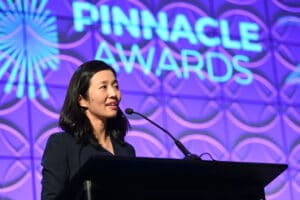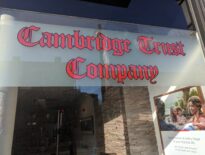
Mayor Michelle Wu delivers the keynote speech at the Boston Chamber of Commerce’s Pinnacle Awards on March 4, 2022. Photo by Isabel Leon | Boston Mayor’s Office
Boston affordable housing developments could see their permitting times slashed to less than six months, Mayor Michelle Wu announced Thursday morning in her first speech before the Greater Boston Chamber of Commerce outlining numerous business-related priorities for her administration.
In her speech, Wu also touted her administration’s push to revitalize downtown retail businesses, spur office-to-residential conversions downtown, streamline the planning process for all developers and work to improve transit and transportation by adding bus and bike lanes – actions, she noted, that municipalities can still take even if they can’t control the MBTA’s actions.
“You can step outside this beautiful hotel to see that there’s not much room to carve out additional roadways,” Wu said. “We need to move more people on our existing streets. That means we need better mass transit and multimodal options.”
Wu said her administration is “laying the foundation for Boston to reach that population peak – 800,000 – again, but this time as the greenest, most sustainable city.”
The city currently sits at 689,326 residents, according to the Census Bureau.
It’s also trying to rein in housing costs by building more housing and more affordable housing, Wu said, noting she is pushing $380 million in federal pandemic aid towards preserving existing affordable housing, building new units and helping residents become homeowners.
“The cost of housing is squeezing the very people who keep our city and region running,” she said, citing the 2,000 vacancies in the city’s own workforce and the 1,500 in the MBTA’s. “We can’t afford to just orient around preventing people from getting priced out. We need to be actively empowering people to thrive.”
Producing more affordable housing faster will be key to meeting this goal.
Noting that it takes around 11 months for an affordable housing project to be approved in the city, resulting in developers spending more money on staff time, design changes and carrying costs for land, Wu promised her permit-streaming executive order will cut that time “in half” while also identifying changes in the approval process to “make it more predictable for everyone.”
The order will allow any affordable housing project on city-owned land won’t have to undergo further review if there was “previous community engagement” during the process of selecting the development for that site, Wu’s office said in a press release issued following her speech.
The order will also direct the Boston Planning & Development Agency to deliver a report within 120 days on how an alternative and more efficient permitting process with “clear and accelerated timelines” for affordable housing developments will work, although any new process must still include “community engagement and thorough agency review,” Wu’s office said.
In addition, city agencies will be directed to give affordable developments priority status on “any and all meeting schedules” and find ways to streamline aspects of their review processes and eliminate any found to be redundant.
The order also establishes a tracking system for reviews of affordable housing developments and establishes an advisory committee to track implementation of the order and recommend further changes for the review of all development projects moving forward.
“This executive order will require City departments to prioritize the review of affordable housing developments and create new processes that will streamline our work and the work of our development partners,” Chief of Housing Sheila Dillon said in a statement issued as part of the press release. “We know that access to affordable housing helps stabilize the lives of those who receive it – giving them predictability in budgeting, and allowing them to put down roots in our neighborhoods. This prioritization is the right thing to do.”
Elsewhere in her speech to the Chamber, the mayor also referenced her longer-term plans to deliver a citywide plan that allows for more growth and more predictability in the city permitting process.
“Many of you know you need a [Zoning Board of Appeal] variance to build a triple-decker on a neighborhood where they line the street,” she said. “Our zoning is holding us back.”
During the question-and-answer session with Chamber CEO Jim Rooney, Wu acknowledged her administration’s new proposal to require future private developments to emit net-zero carbon from the day they open, but cast the proposal as a necessary step to keep the city viable over the long term.
Perhaps the biggest applause line of Wu’s speech was a pledge a brand-new building for its Madison Park Technical Vocational High School and revitalize the school’s programming to meet the needs of today’s employers.
“We’re drawing lessons from some of the most innovative vocational schools in the country and from the dreams of people who’ve been fighting for this for decades,” Wu said to resounding applause from the audience of business leaders. “It will be transformative for the Boston Public Schools system and the organizations you lead.”
The school has often been pointed to – including by Rooney – as a missing piece in efforts to train more construction workers to reduce the squeeze on labor costs in development and lift Bostonians out of poverty.
But for decades, Madison Park has also languished without effective attention from previous mayors or schools leaders.
In a question-and-answer session with Wu following her speech, Rooney asked her to look to the city’s business community as a partner in her effort.
Updated: 1:19 p.m., Sept. 29, 2022: This story has been updated with more information on Mayor Michelle Wu’s planned executive order provided by her office.






